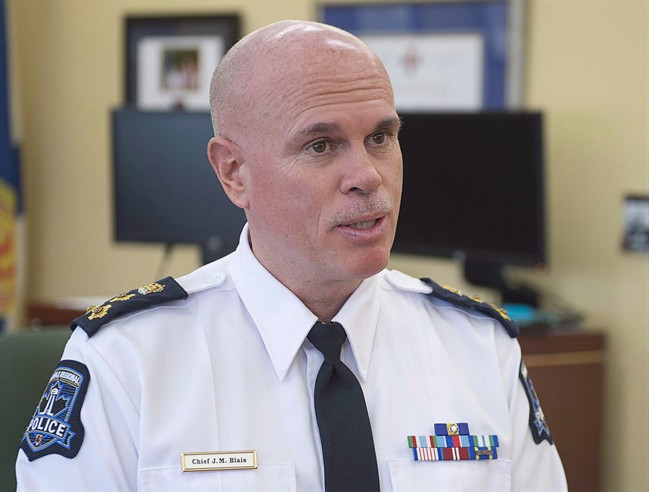A local advocacy group is hoping to push public officials in multiple levels of government to end the practice of street checks — or carding — in Halifax.

Solidarity Halifax, has urged Haligonians to contact officials in the police department, municipal government and provincial governments as they push to put a moratorium on what they call racist and discriminatory practice against the city’s African Nova Scotian population.
“The idea is that folks outside the black community have to pay attention to this issue as well and stand in solidarity with the black community’s demands,” Ben Sichel, an organizer with Solidarity Halifax, told Global News on Wednesday.
READ MORE: Black in Halifax? You’re three times more likely to undergo police check
The group encourages its supporters to contact councillors, politicians and even Halifax Regional Police Chief Jean-Michel Blais through phone or by a form letter they’ve provided.
The group has spread the campaign across three days with each day focusing on a different level of government. On Thursday the organization plans to target Nova Scotia MLAs.
Sichel says while MLAs aren’t normally considered to have a role in municipal policies he believes that they can exert some power over the region’s police forces.
“They could come out and say ‘I’m listening to my constituents and this is wrong,'” he said.
“It’s not that hard to believe them”

Get breaking National news
Statistics
A report from the Halifax RCMP – which patrols certain parts of the Halifax Regional Municipality – released earlier this year, found that in the first 10 months of 2016, 41 per cent of 1,246 street checks involved African Nova Scotians.
The Halifax Regional Police figures showed that of the roughly 37,000 people checked between 2005 and 2016, almost 4,100 —or just over 11 per cent — were black, despite making up only 3.59 per cent of the municipal population, according to the 2011 census.
Both Nova Scotia’s premier and Halifax’s mayor have voiced concerns about the numbers.
The police say they are working with the Nova Scotia Human Rights Commission on the practice of street checks. The police say they’re analyzing the street check data though there is no indication of what the end result will be.
WATCH: Street Checks statistics

A back and forth
Halifax Regional Police have so far indicated that they have no plans to stop the practice of street checks.
“We remain committed to the robust analysis of our street checks … reaching out to our communities and improving our practices based on this work,” said Dianne Penfound, a spokesperson with the Halifax Regional Police.
Members of Solidarity Halifax provided Global News with responses from Blais to their complaints.
“If it were only as a result of racism, then simply stopping the practice and implementing various training and accountability solutions would, indeed, address the issue … I suspect that the issue is a lot more nuanced than what people would like to believe,” wrote Blais.
“We owe it to our communities and from my perspective, to the hard-working police officers who take issue with being branded racist simply because of statistics, to better understand the context around this.”
READ MORE: Halifax RCMP conduct street checks on black people more than Halifax police
Sichel says that response is just not good enough and sent his own response to Blais.
“It is infuriating that you would privilege the alleged hurt feelings of some of your officers over the actual harm that this practice is causing to members of the African Nova Scotian community. I believe your officers are not so fragile as to be unable to handle criticism,” he wrote.
“White Haligonians have the luxury of ignoring this issue if they wish. This is not the case for Black Haligonians. Please do the right thing.”
At the time of publication Blais has yet to respond to the email.
— With files from the Canadian Press








Comments